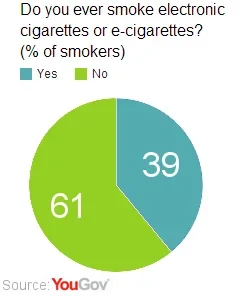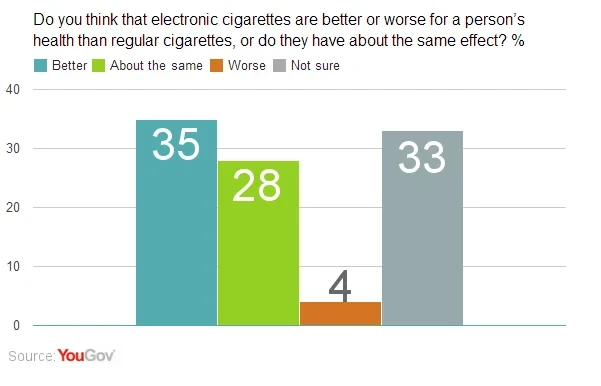Confusion reigns as to whether or not e-cigarettes are as bad for you as regular cigarettes, while two-fifths of smokers say that they also use e-cigarettes
Last week New York City passed a law to ban on electronic cigarettes in public places. These "e-cigs" had, before this point, often been allowed anywhere, even indoors. The nicotine 'vapor' is said to pose less of a threat to others than secondhand smoke. New york City isn't the first place to pass a law like this, as New Jersey already considered e-cigarettes to be legally the same as cigarettes and thus banned indoors. The cities of Chicago and Los Angeles are considering a similar ban, because it "makes smoking seem normal again", thus undermining smoking bans that are seen as a major public health accomplishment of the past 10-15 years.
The latest YouGov research shows that nearly 2 in 5 smokers, use electronic cigarettes. It is hard to tell whether smokers are using them in an attempt to quit, which is how they are marketed, or just as a nicotine substitute. Some smokers are known to use e-cigarettes in places they normally can't smoke, like bars or restaurants, instead of going outside.

What is clear, though, is that proponents of public smoking bans view e-cigarettes as a threat to public health. New York City Councilman James Gennaro, a sponsor of the legislation banning e-cigarettes inside, said that smoking e-cigarettes inside would "send the wrong message to kids", as well as highlighting that the actual health consequences of e-cigarettes are still unknown even if they are "touted as safer than cigarettes".
There seems to be some confusion as to whether they are actually better for people than regular cigarettes. One third of Americans are unsure, while more than a quarter (28%) think that you run the same risk smoking a cigarette as an e-cigarette. Nicotine, by itself, has not been shown to cause any type of cancer, though it is linked to heart problems.

Though the e-cigarette may be healthier, the increasing use of this 'cigarette-look-alike' among children, and confusion about health risks has led to skepticism of their overall health impact. As the e-cigarette makers face bans in new cities, companies are under growing pressure to clarify what, exactly, are e-cigarettes for. Are they an alternative, are they a substitute, or are they an aid to quit smoking?
Full poll results can be found here.
Image: Getty








